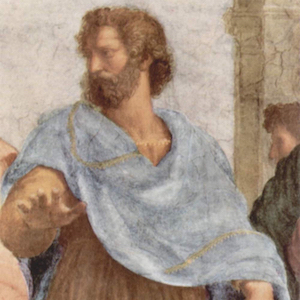Aristotle

This course is a close study of one of the most preeminent philosophers, Aristotle. We will try to understand Aristotle’s sometimes puzzling writings, consider his substantial philosophical views, as well as the reasons he gave for endorsing those views.
Class Schedule, 2019 Fall
(updated: 8/29/2019)
| Date and topic | Presenter |
|---|---|
| Aug 27, Introduction (Protrepticus) | |
| Aug 29, Background (Parmenides, Plato) | |
| Sep 3, Life and works (Diogenes Laertius) | |
| Sep 5, Natural science (Meta. V.4 (270--271), VI.1 (278--280); Phys. I (81--93)) | |
| Sep 10, Explaining change (Phys. II (93--111)) | |
| Sep 12, Place and time (Phys. IV (120--127)) | Farrah H |
| Sep 17, Thinking about science (Anal. post. I (39--49)) | Can U |
| Sep 19, Scientific explanation (Anal. post. II (50--59)) | Matt M |
| Sep 24, Further characteristics (Topics I (60--78)) | |
| Sep 26, Logic and its limits (De int. (12--23)) | Daniel L |
| Oct 1, Early ontology (Cat. (5--11)) | |
| Oct 3, Back to physics: Zeno's racecourse (Phys. VI.9) | |
| Oct 10, Back to physics 2: unmoved mover (Phys. VIII (127--131)) | |
| Oct 15, Form and substance (Meta. VII.1--9 (284--298)) | David H |
| Oct 17, Definition and substance (Meta. VII.10--17 (298--313)) | Shunsuke A |
| Oct 22, Action and passion (Meta. IX (321--335)) | Gibson H |
| Oct 24, Back to the unmoved mover (Meta. XII (339--355)) | |
| Oct 29, Application: the soul (De an. I-II.4 (161--174)) | |
| Oct 31, Perception (De an. II.5--12 (174--187)) | Morgan H |
| Nov 5, Thinking (De an. III (187--205)) | Ivan K |
| Nov 7, Memory (De mem. (206--213)) | |
| Nov 12, Living well (EN I (363--376)) | Robert W |
| Nov 14, Virtues (EN II (376--387)) | |
| Nov 19, Akrasia (EN VII (431--452)) | Adam F |
| Nov 21, Friendship (EN IX (452--459)) | |
| Nov 26, The contemplative life (EN X.6--9 (468--478)) | |
| Dec 3, Peer review day | |
| Dec 5, Review (Shields) |
Assignments
Presentation and short paper
Final paper (due: Dec. 3)
Other things
Fragments from Aristotle’s Protrepticus
Background: Parmenides and Plato
Diogenes Laertius on Aristotle
Why care about reading dead people anyway?
Bibliography
(updated: 8/29/2019)
There is an immense amount of literature both on Aristotle in general and on practically every one of his major ideas. These books are only meant to give you a start; the best thing to do is to check out their bibliography and see if you find anything that looks relevant to your topic. As always, the SEP is also a good resource.
A couple of general sources on Ancient Philosophy
William Guthrie. A History of Greek Philosophy. Cambridge: Cambridge University Press, 1962–81. 6 vols., from the Presocratics to Aristotle.
Terence Irwin. Classical Thought. Oxford: Oxford University Press, 1989.
Christopher Shields. Ancient Philosophy: A Contemporary Introduction. London: Routledge, 2012. A general introduction to Ancient Greek philosophy, focusing on arguments. It also contains a very good bibliography.
Aristotle in particular
Christopher Shields. Aristotle. London: Routledge, 2014. Highly recommended introduction with excellent introductory bibliography.
Sir David Ross. Aristotle. Oxford: Oxford University Press, 1984. The “standard” book on Aristotle’s philosophy, even though very old (1923).
J. Ackrill. Aristotle the Philosopher. Oxford: Oxford University Press, 1981.
Jonathan Barnes. Aristotle: A Very Short Introduction. Oxford: Oxford University Press, 1982.
Jonathan Lear. Aristotle: The Desire to Understand. Cambridge: Cambridge University Press, 1988. Not quite comprehensive but very engaging.
Christopher Shields, ed. The Oxford Handbook of Aristotle. Oxford: Oxford University Press, 2012.
Jonathan Barnes, ed. The Cambridge Companion to Aristotle. Cambridge: Cambridge University Press, 1995.
G. Anagnostopoulos, ed. A Companion to Aristotle. Blackwell, 2009.